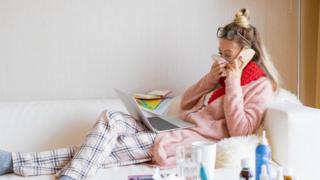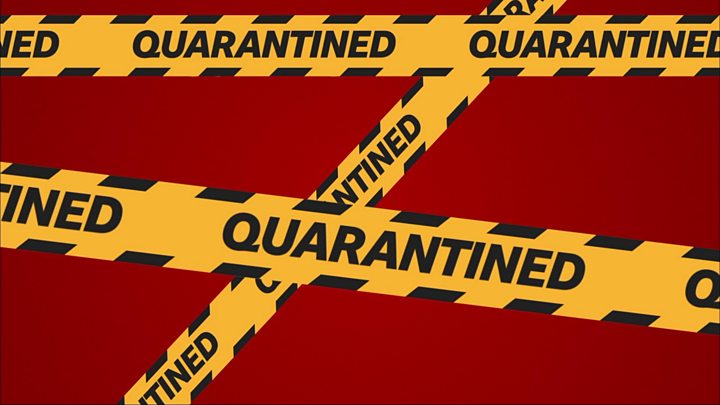 Image copyright
Image copyright
Getty Images
Some people are being asked to isolate themselves to prevent the spread of coronavirus.
So, what do you need to know about self-isolation and how to do it?
Do I need to self-isolate?
You may need to isolate yourself if you have travelled to an affected area, or have been in close contact with an infected person.
Spending 15 minutes within 2m (6ft) of someone with the virus, or having face-to-face contact, is judged to be a significant risk.
When someone tests positive for the virus, health authorities try to trace everyone they have spent time with. They will then tell those people whether they need to self-isolate.
Image copyright
Getty Images
Steer clear of the shops – order a delivery or ask a friend for help
Advice for people who have travelled back to the UK from the main affected areas and some other countries has been issued by the government. Full details of the countries concerned and whether you need to self-isolate are available here.
Don’t go to the GP or hospital – stay indoors and call NHS 111, even if your symptoms – which can include a cough, fever or shortness of breath – are mild. (In parts of Wales where 111 isn’t available, call NHS Direct on 0845 46 47. In Northern Ireland, call your GP).
What should I do in self-isolation?
Self-isolation means staying at home for 14 days, not going to work, school or other public places, and avoiding public transport or taxis, says Public Health England.
“Common-sense” steps include staying in a well-ventilated room with a window that can be opened and keeping away from other people in your home.
Ask for help if you need groceries, other shopping or medication.
It’s OK to have friends, family or delivery drivers drop off supplies to get you through the two weeks.
But you shouldn’t have any visitors, PHE says. You can have deliveries left on the doorstep.
There have been reports of people stocking up with food and other essentials, with items such as hand sanitiser selling out in some shops.
But the government chief science adviser, Sir Patrick Vallance, says: “There’s absolutely no reason to be going out and doing any panic-buying or getting any large supplies of things.”
What if someone self-isolating shares a home?
If you are self-isolating and share a kitchen, try to avoid using it when other people are there and take your meals back to your room to eat. Clean all the surfaces at home with household cleaning products daily.
Although you might not be able to entirely separate yourself from family members or flatmates, the advice is to limit contact as much as possible.
People living with someone in isolation should wash their hands often, using soap and water for at least 20 seconds – especially after coming into contact with them or something they have handled.
You shouldn’t share towels, toiletries or other household items with someone in isolation and they should have a separate bathroom and toilet.

Media playback is unsupported on your device
If that is not possible, the isolated person should use the bathroom last, cleaning it thoroughly afterwards if they are able.
Any rubbish that the isolated person has been in contact with should be double-bagged. Don’t throw these bags away until you know whether or not the isolated person has the virus.
If the person tests positive, you will be told what to do with their waste.
Will I still get paid?
Employers should help prevent the spread of the virus by providing sick pay to people told to self-isolate, the government says.
If you’re a permanent employee and unable to work because you’re ill with the virus, you’re entitled to your usual sick pay. Statutory sick pay is £94.25 a week after the first three days – although the government plans emergency legislation in order for it to start on day one.
Many casual or agency workers may also be entitled to sick pay but self-employed people are not. Citizens Advice says people on zero-hours contracts can still get sick pay and should ask their employer.
However, if you don’t have symptoms and you’re told to self-isolate as a precaution, there’s no automatic legal right to sick pay. Prime Minister Boris Johnson says this is under review.
In the meantime, the government says you can claim universal credit or employment and support allowance if you’re prevented from working for public health reasons.
If you need to care for a relative or your child’s school is closed and you need to look after them at short notice, your employer must give you time off.
You probably won’t get paid for it, unless it says so in your contract – but you may be able to work from home.
Source: CNN Africa
